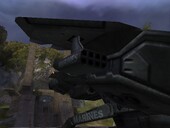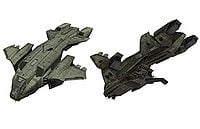D77-TC Pelican: Difference between revisions
From Halopedia, the Halo wiki
(Reverted vandalism) |
|||
| Line 52: | Line 52: | ||
==Payload Capacity== | ==Payload Capacity== | ||
The Pelican could carry | The Pelican could carry passeers and cargo using a combination of internal and external methods. | ||
The internal bay amidship was the simplest way of transporting supplies and personnel. The default configuration provided seating for ten persons. | The internal bay amidship was the simplest way of transporting supplies and personnel. The default configuration provided seating for ten persons. | ||
Revision as of 14:11, February 25, 2007
| This article does not meet the wiki's general standards and/or standards on layouts. You can help by cleaning this article. |
The D77-TC Pelican was the UNSC's primary tactical support aerocraft, fulfilling the role of tactical transport and gunship since, at least, 2525. The Pelican's crew compartments maybe sealed and the craft made suitable for limited space flight.
Payload Capacity
The Pelican could carry passeers and cargo using a combination of internal and external methods.
The internal bay amidship was the simplest way of transporting supplies and personnel. The default configuration provided seating for ten persons.
The large aft overhang provided an attachment point for additional (and possibly oversized) cargo and ordnance. Possible payloads included a M-779 troop carrier[1], a Scorpion Tank, or fuel pods allowing for in-flight refueling over other aerocraft.
Weapon Systems
Standard armament consisted of a chin-mounted chain gun. A 40mm model was common prior to 2525 but was later superseded by a 70mm weapon. A missile pod, each holding eight Anvil-II ASMs, could be mounted under each wing to engage more maneuverable or better protected targets. Fire control was typically delegated to the co-pilot, who was assisted by helmet mounted display.
A machine gun or 25mm grenade launcher could also be mounted facing out of the rear cargo hatch and folded flat against the roof of the internal bay when not in use by the crew chief or passenger.
Propulsion
The main engines were mounted in pairs in four nacelles, one on each wing and two at the rear. The nacelles could articulate independently, thus altering the direction of thrust and improving the dropship's low altitude maneuverability. Six ventral thrusters, two on each wing nacelle and one on each aft nacelle, allowed the Pelican to land and take off vertically.
Character Compatibility
Identified Pelicans
Trivia
- The original Pelican model is similar to the UD-4L Cheyenne Dropship from the movie Aliens.
File:Drp-blprnt schematics.jpg
- Pelicans in Halo 1 and 2 are never seen carrying more than five human troops at a time, despite being capable of carrying up to twelve to fifteen. However, it is likely that this is merely because UNSC troops usually work in small teams during engagements, comprising of 5 to 6 men, known as fireteams.
- Although in Halo 2 the Pelican carries two missile pods, each loaded with 8 Anvil-II High Explosive missiles, the only time the dropships ever uses them in combat is during the end of the level 'Metropolis', when it launches them against the scarab. Its 70mm chain gun, on the other hand, is used twice during 'Outskirts', both times against Jackals. Also, in the level Delta Halo, when the Pelican drops off the Scorpion and there are Covenant left alive, the Pelican will attack with its chain gun.
- Without player modifications, Pelicans may only be ridden in, but not piloted, by players.
Images
File:Odstsinpelican.jpg 
Sources
- ^ [Halo: First Strike]]
